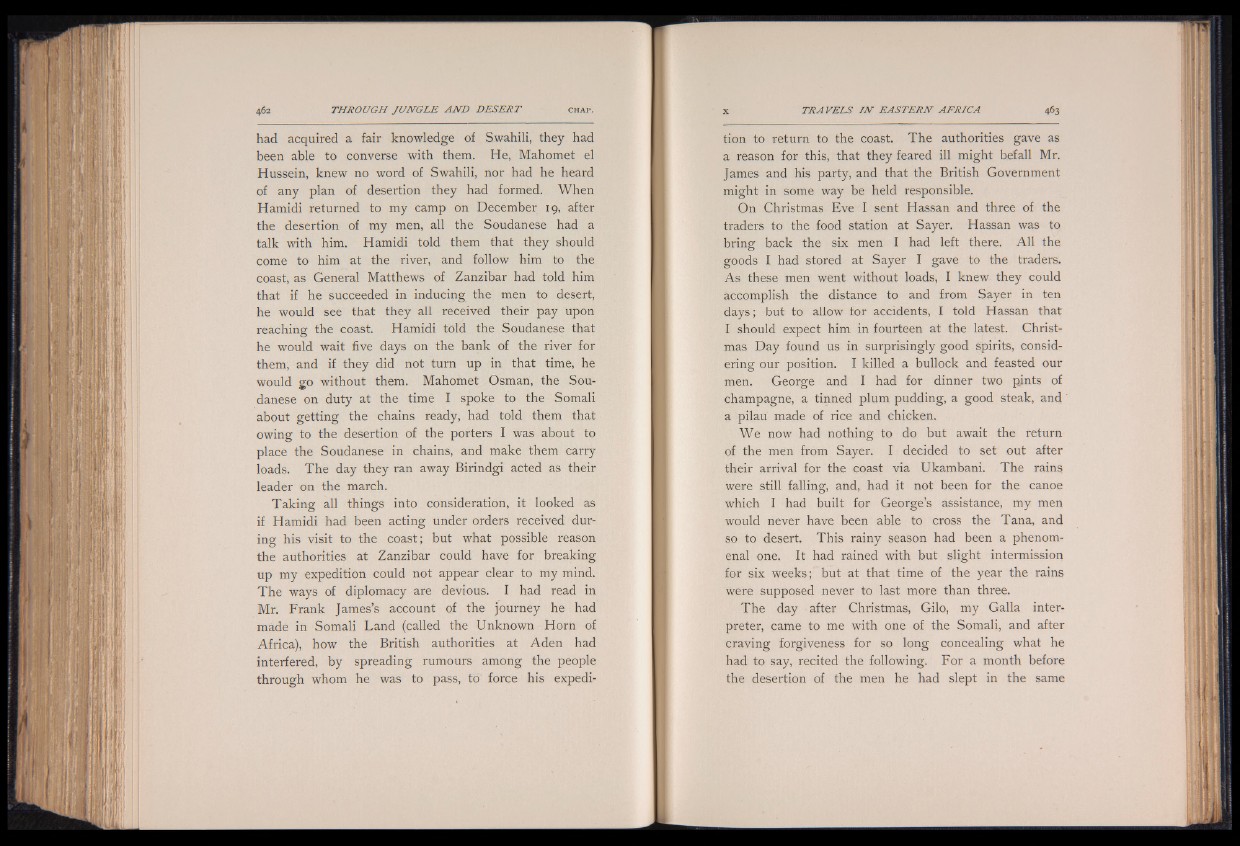
had acquired a fair knowledge of Swahili, they had
been able to converse with them. He, Mahomet el
Hussein, knew no word of Swahili, nor had he heard
of any plan of desertion they had formed. When
Hamidi returned to my camp on December 19, after
the desertion of my men, all the Soudanese had a
talk with him. Hamidi told them that they should
come to him at the river, and follow him to the
coast, as General Matthews of Zanzibar had told him
that if he succeeded in inducing the men to desert,
he would see that they all received their pay upon
reaching the coast. Hamidi told the Soudanese that
he would wait five days on the bank of the river for
them, and if they did not turn up in that time, he
would go without them. Mahomet Osman, the Soudanese
on duty at the time I spoke to the Somali
about getting the chains ready, had told them that
owing to the desertion of the porters I was about to
place the Soudanese in chains, and make them carry
loads. The day they ran away Birindgi acted as their
leader on the march.
Taking all things into consideration, it looked as
if Hamidi had been acting under orders received during
his visit to the coast; but what possible reason
the authorities at Zanzibar could have for breaking
up my expedition could not appear clear to my mind.
The ways of diplomacy are devious. I had read in
Mr. Frank James’s account of the journey he had
made in Somali Land (called the Unknown Horn of
Africa), how the British authorities at Aden had
interfered, by spreading rumours among the people
through whom he was to pass, to force his expedition
to return to the coast. The authorities gave as
a reason for this, that they feared ill might befall Mr.
James and his party, and that the British Government
might in some way be held responsible.
On Christmas Eve I sent Hassan and three of the
traders to the food station at Sayer. Hassan was to
bring back the six men I had left there. All the
goods I had stored at Sayer I gave to the traders.
As these men went without loads, I knew they could
accomplish the distance to and from Sayer in ten
days; but to allow for accidents, I told Hassan that
I should expect him in fourteen at the latest. Christmas
Day found us in surprisingly good Spirits, considering
our position. I killed a bullock and feasted our
men. George and I had for dinner two pints of
champagne, a tinned plum pudding, a good steak, and
a pilau made of rice and chicken.
We now had nothing to do but await the return
of the men from Sayer. I decided to set out after
their arrival for the coast via Ukambani. The rains
were still falling, and, had it not been for the canoe
which I had built for George’s assistance, my men
would never have been able to cross the Tana, and
so to desert. This rainy season had been a phenomenal
one. It had rained with but slight intermission
for six weeks; but at that time of the year the rains
were supposed never to last more than three.
The day after Christmas, Gilo, my Galla interpreter,
came to me with one of the Somali, and after
craving forgiveness for so long concealing what he
had to say, recited the following. For a month before
the desertion of the men he had slept in the same